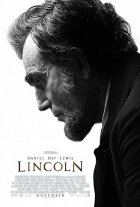
Lincoln
EXT. BATTLEFIELD, JENKINS' FERRY, ARKANSAS - DAY
Heavy grey skies hang over a flooded field, the water two
feet deep. Cannons and carts, half-submerged and tilted,
their wheels trapped in the mud below the surface, are still
yoked to dead and dying horses and oxen.
A terrible battle is taking place; two infantry companies,
Negro Union soldiers and white Confederate soldiers, knee-
deep in the water, staggering because of the mud beneath,
fight each other hand-to-hand, with rifles, bayonets,
pistols, knives and fists. There's no discipline or strategy,
nothing depersonalized: it's mayhem and each side intensely
hates the other. Both have resolved to take no prisoners.
HAROLD GREEN (V.O.)
Some of us was in the Second Kansas
Colored. We fought the rebs at
Jenkins' Ferry last April, just
after they'd killed every Negro
soldier they captured at Poison
Springs.
EXT. PARADE GROUNDS ADJACENT TO THE WASHINGTON NAVY YARD,
ANACOSTIA RIVER - NIGHT
Rain and fog. Union Army companies are camped out across the
grounds. Preparations are being made for the impending
assault on the Confederate port of Wilmington, North
Carolina.
Two black soldiers stand before a bivouacked Negro unit:
HAROLD GREEN, an infantryman in his late thirties, and IRA
CLARK, a cavalryman in his early twenties. ABRAHAM LINCOLN
sits on a bench facing Harold and Ira; his stovepipe hat is
at his side.
HAROLD GREEN:
So at Jenkins' Ferry, we decided
warn't taking no reb prisoners.
And we didn't leave a one of `em
alive. The ones of us that didn't
die that day, we joined up with the
116th U.S. Colored, sir. From Camp
Nelson Kentucky.
LINCOLN:
What's your name, soldier?
HAROLD GREEN:
Private Harold Green, sir.
2.
IRA CLARK:
I'm Corporal Ira Clark, sir. Fifth
Massachusetts Cavalry. We're
waiting over there.
He nods in the direction of his cavalry.
IRA CLARK (CONT'D)
We're leaving our horses behind,
and shipping out with the 24th
Infantry for the assault next week
on Wilmington.
LINCOLN:
(to Harold Green:)
How long've you been a soldier?
HAROLD GREEN:
Two year, sir.
LINCOLN:
Second Kansas Colored Infantry,
they fought bravely at Jenkins'
Ferry.
That's right, sir. They killed a thousand rebel
soldiers, sir. They were very
brave.
(hesitating, then)
each month than white
soldiers.
Harold Green is a little startled at Clark's bluntness.
HAROLD GREEN:
Us 2nd Kansas boys, whenever we
fight now we -
IRA CLARK:
Another three dollars subtracted
from our pay for our uniforms.
HAROLD GREEN:
That was true, yessir, but that
CHANGED -
IRA CLARK:
Equal pay now. Still no
commissioned Negro officers.
LINCOLN:
I am aware of it, Corporal Clark.
3.
IRA CLARK:
Yes, sir, that's good you're aware,
sir. It's only that -
HAROLD GREEN:
(to Lincoln, trying to
change the subject:)
You think the Wilmington attack is
gonna be -
IRA CLARK:
accustomed themselves to seeing
Negro men with guns, fighting on
their behalf, and now that they can
tolerate Negro soldiers getting the
same pay - in a few years perhaps
they can abide the idea of Negro
lieutenants and captains. In fifty
years, maybe a Negro colonel. In a
hundred years - the vote.
Green's offended at the way Clark is talking to Lincoln.
LINCOLN:
What'll you do after the war,
Corporal Clark?
IRA CLARK:
Work, sir. Perhaps you'll hire me.
LINCOLN:
Perhaps I will.
IRA CLARK:
But you should know, sir, that I
get sick at the smell of bootblack
and I can't cut hair.
Lincoln smiles.
LINCOLN:
I've yet to find a man could cut
mine so it'd make any difference.
HAROLD GREEN:
You got springy hair for a white
man.
Lincoln laughs.
4.
LINCOLN:
Yes, I do. My last barber hanged
himself. And the one before that.
Left me his scissors in his will.
Green laughs.
TWO WHITE SOLDIERS have come up, two young kids, nervous and
excited.
President Lincoln, sir? Evening, boys.
SECOND WHITE SOLDIER
Translation
Translate and read this script in other languages:
Select another language:
- - Select -
- 简体中文 (Chinese - Simplified)
- 繁體中文 (Chinese - Traditional)
- Español (Spanish)
- Esperanto (Esperanto)
- 日本語 (Japanese)
- Português (Portuguese)
- Deutsch (German)
- العربية (Arabic)
- Français (French)
- Русский (Russian)
- ಕನ್ನಡ (Kannada)
- 한국어 (Korean)
- עברית (Hebrew)
- Gaeilge (Irish)
- Українська (Ukrainian)
- اردو (Urdu)
- Magyar (Hungarian)
- मानक हिन्दी (Hindi)
- Indonesia (Indonesian)
- Italiano (Italian)
- தமிழ் (Tamil)
- Türkçe (Turkish)
- తెలుగు (Telugu)
- ภาษาไทย (Thai)
- Tiếng Việt (Vietnamese)
- Čeština (Czech)
- Polski (Polish)
- Bahasa Indonesia (Indonesian)
- Românește (Romanian)
- Nederlands (Dutch)
- Ελληνικά (Greek)
- Latinum (Latin)
- Svenska (Swedish)
- Dansk (Danish)
- Suomi (Finnish)
- فارسی (Persian)
- ייִדיש (Yiddish)
- հայերեն (Armenian)
- Norsk (Norwegian)
- English (English)
Citation
Use the citation below to add this screenplay to your bibliography:
Style:MLAChicagoAPA
"Lincoln" Scripts.com. STANDS4 LLC, 2025. Web. 21 Feb. 2025. <https://www.scripts.com/script/lincoln_43>.







Discuss this script with the community:
Report Comment
We're doing our best to make sure our content is useful, accurate and safe.
If by any chance you spot an inappropriate comment while navigating through our website please use this form to let us know, and we'll take care of it shortly.
Attachment
You need to be logged in to favorite.
Log In